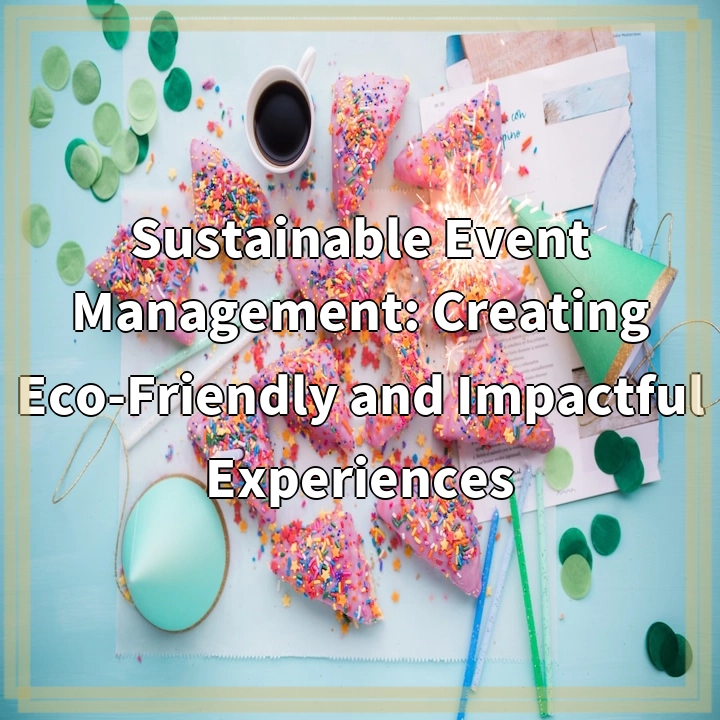
What is Sustainable Event Management?
Sustainable Event Management is a practice that aims to minimize the negative environmental, social, and economic impacts of events while maximizing their positive contributions. It involves incorporating sustainable practices, principles, and technologies into various aspects of event planning and organization, from venue selection and waste management to transportation and energy consumption. By adopting sustainable event management practices, event organizers can reduce resource consumption, minimize waste generation, and promote social responsibility, all while creating memorable and impactful experiences for attendees.
Real-World Problems Associated with Sustainable Event Management
Despite the growing awareness and adoption of sustainable event management, several challenges still need to be addressed. These real-world problems can hinder the effective implementation of sustainable practices and require innovative solutions to overcome them. Some of the key challenges include:
Venue Selection and Infrastructure
Choosing a sustainable venue is crucial for reducing the environmental impact of an event. However, finding suitable venues with adequate sustainability practices and infrastructure can be a challenge, particularly in certain regions or for large-scale events. Limited availability of eco-friendly venues and the need for retrofitting existing venues can pose obstacles to sustainable event management.
Resource Consumption and Waste Management
Events often involve high resource consumption, such as energy, water, and food. Managing these resources efficiently and minimizing waste generation is a critical aspect of sustainable event management. However, logistical challenges, limited recycling and composting facilities, and lack of awareness among event attendees can hinder effective waste management efforts.
Transportation and Carbon Footprint
Transportation is a major contributor to an event’s carbon footprint. Whether it’s attendees traveling to the event or suppliers transporting goods and equipment, finding sustainable transportation options can be difficult. Limited public transportation infrastructure, lack of incentives for carpooling or using low-emission vehicles, and long-distance travel can all contribute to increased carbon emissions associated with events.
Cost and Investment
Implementing sustainable event management practices often requires additional investment and resources. However, the perception that sustainability comes with a higher cost can deter event organizers from prioritizing eco-friendly measures. Overcoming this challenge involves showcasing the long-term benefits and cost savings associated with sustainable practices, as well as exploring partnerships and sponsorships that align with sustainability goals.
By addressing these real-world problems and finding creative solutions, sustainable event management can become a driving force for positive change in the events industry. By promoting environmentally-friendly practices, minimizing waste, and engaging attendees, event organizers can create memorable and impactful experiences that leave a lasting impression while preserving the planet for future generations.

Potential Solutions for Sustainable Event Management
To overcome the real-world problems associated with sustainable event management, event organizers can consider implementing the following solutions:
Collaboration and Partnerships
Collaborating with sustainability-focused organizations, local governments, and suppliers can help event organizers find sustainable venues, gain access to eco-friendly resources, and share best practices. Building strong partnerships can also lead to cost-sharing opportunities and increase the overall impact of sustainable event initiatives.
Sustainability Assessments and Certifications
Conducting sustainability assessments can help event organizers identify areas of improvement and set specific targets for reducing environmental impacts. Pursuing third-party certifications, such as LEED or ISO 20121, can demonstrate the event’s commitment to sustainability and provide a framework for implementing sustainable practices throughout the planning and execution stages.
Educating and Engaging Stakeholders
Raising awareness about sustainable event practices among stakeholders, including event staff, attendees, and vendors, is crucial for driving change. Educating stakeholders about the benefits of sustainability, providing clear guidelines and instructions for waste separation and reduction, and promoting sustainable transportation options can foster a culture of sustainability within the event community.
Innovation and Technology
Adopting innovative technologies can help reduce resource consumption and improve waste management. From using renewable energy sources for power generation to implementing smart waste tracking systems and employing virtual and augmented reality experiences to reduce the need for physical materials, technology can play a significant role in achieving sustainable event management goals.
Monitoring and Reporting
Tracking and measuring the environmental and social impact of events through monitoring and reporting systems can provide valuable data for future improvements and benchmarking. Implementing key performance indicators (KPIs), conducting post-event evaluations, and sharing sustainability reports publicly can enhance transparency and accountability, while also providing valuable insights for continuous improvement.
By adopting these solutions and embracing the principles of sustainable event management, organizers can create eco-friendly and impactful experiences that not only minimize environmental harm but also contribute to the overall well-being of attendees and communities. Through collective efforts, the event industry can lead the way towards a more sustainable and responsible future.















